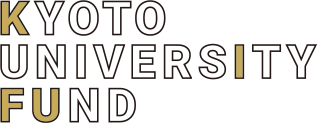Vol.4 Messages from graduates
Messages from graduates: Special Event on the 10th Kyoto University Homecoming Day
There Are Multiple Paths for Career Development!
A highlight of the 10th homecoming day, held on November 7, 2015, was a special event, comprising a lecture and a panel discussion, on the theme: Career Development of Kyoto University Students.
To this event, graduates from the university, who are active in a wide variety of genres, were invited as a lecturer and several panelists. The organizers expected that their statements regarding their own paths of career development would provide the audience, comprising both students and recent graduates, with opportunities to consider their future careers, and to understand that there are multiple paths for career development.
Part I. Lecture
Life Is a Journey in Quest for Something Interesting
When I leave this world, I hope I can say, "My life has been very interesting."
In Part I, a lecture was given by Mr. Nobuo Sayama, Representative Director & Partner of Integral Corporation, an investment fund. He said that in the quest for something interesting, he has continued to take on challenges. He encouraged the audience, saying, "You are 10 years younger now than you will be 10 years from now, and you have greater potential. So you should seek something interesting and lead an enjoyable life."
Nobuo Sayama
Representative Director & Partner
Integral Corporation
Chairman & Representative Director, Skymark Airlines Inc.
After graduating from the Department of Polymer Chemistry of the Faculty of Engineering of Kyoto University in 1976, he worked for Teijin Limited and Mitsui Bank (currently, Sumitomo Mitsui Banking Corporation). In 1998, he co-founded Unison Capital, Inc. and became its Representative Director & Partner. In 2004, he co-founded GCA (currently, GCA Savvian), an advisory firm, and became its Representative Director & Partner. In 2007, he co-founded Integral Corporation and became its Representative Director & Partner (current position). In September 2015, he was appointed as Chairman & Representative Director of Skymark Airlines Inc.
He has earned an MBA from New York University, and a Ph.D. from the Graduate School of Decision Science and Technology of Tokyo Institute of Technology. Currently, he serves as a professor at the Graduate School of International Corporate Strategy of Hitotsubashi University, and a visiting professor of the Graduate School of Management of Kyoto University.
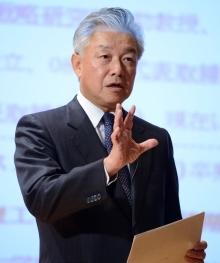
You Are the Playwright and Leading Actor of the Drama of Your Own Life.
After graduating from the Faculty of Engineering of Kyoto University, Mr. Nobuo Sayama joined Teijin Limited, a major textile manufacturer in Japan. He enjoyed working in the factory and even liked its three-shift working system. Until the age of 30, he said he was an exemplary employee who firmly believed that every single effort would pay off in the long term. However, when he turned 30, he began to consider that it was sheer luck, rather than efforts, that decided whether or not he would become the president of the company.
At the age of 33, he applied for a job at Mitsui Bank (currently, Sumitomo Mitsui Banking Corporation). In the interview he received for the bank employment, he learned about M&A for the first time and became interested in it. Mr. Sayama's policy in life is to engage himself in something interesting, so that at the end of his life, he would be able to say, "My life has been very interesting." Since you can never predict what will happen five years or 10 years from now, it's best to engage in something that you find interesting. Mr. Sayama said that he had always selected his career options without considering the amount of salary he would earn. "You can get money back someday, but you can never get time back," he said.
I never consulted with anyone else at the turning points of my life, since I am the one who ponders my life the most seriously. When I changed my job, I explained my decision to my family and the companies concerned, but I never tried to make them understand. In any case, it's impossible to make them understand my decision.
Beginning something new of course involves the risk of failure. Regardless of the high risk, he continued to take on challenges, mainly because he was seeking something interesting amid the challenges. He also believed that even if he failed, he would be able to learn from the failure.
"You don't call something a challenge if it's easy for anyone to do. I've dared to take on a challenge that everyone said was impossible to do. Since no one dared to do what seemed to be impossible, I had no competitors, and this enabled me to survive to date amid the severe competition."
After concluding his lecture with these words, Mr. Sayama climbed down from the platform and began discussions with the audience, comprising both students and graduates.
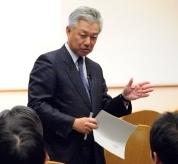
Student What does "interesting" mean to you?
Sayama Anything I don't know or that's unpredictable is "interesting" to me. I enjoy situations where something is unknown and there's no knowing what will happen.
Student: By preparing for a failure, you can insure yourself against the worst case. If you have no safety net, on the other hand, you're forced to make all-out efforts and so you can exert the best performance, I assume.
Sayama When I quit Teijin Limited, I planned to take the bar exam. This was far from insuring, since the probability of failure was much higher than that of success. If you're too worried about failure, you can't focus your attention. So, I believe you should insure yourself by preparing for another option in case. This will help you focus and address whatever challenges you meet squarely.
Student In the lecture, you said that you thought it was sheer luck that decided whether or not you would become President. However, if you take on many challenges, I believe you will have more opportunities to "catch" good luck.
Sayama Yes, I agree. The probability of success depends on the number of challenges you take on. I often hear individuals who have a great success say, "Well, I was just lucky." However, I don't think they were simply lucky. They took on many challenges, which others regarded as reckless, experienced many failures, and so they were able to catch a good opportunity.
You are 10 years younger now than you will be 10 years from now,
and you have greater potential.
Finally, Mr. Sayama delivered the following two messages to the audience.
First, what you consider ordinary will be extraordinary in the future. So you should enjoy the present. Second, no matter how old you are, you are 10 years younger now than you will be 10 years from now, and you have greater potential. Just imagine the situation of the world and yourself when you are 10 years older. Many people say, "I've grown old," because they compare their present situation with the past. These people also tend to regret that they didn't do this or that when they were younger. You still have many things that you can do now, but may not be able to do 10 years from now. If you think like this, you will surely understand my attitude toward life. I mean, rather than career development, I have prioritized my quest for something interesting.
Kyoto University brings together many students who are eager to take on challenges that no one has ever taken. He concluded the lecture, saying, "Please lead interesting and enjoyable lives."
Part II: Panel Discussion
Career Development for Kyoto University Students: Continuity and Discontinuity.
In Part II, a panel discussion was held, involving five graduates as panelists. The facilitator was Mr. Takashi Mitachi, who was then the Co-Chairman (Japan) of The Boston Consulting Group.
The panel discussion began with Mr. Mitachi's greeting, in which he said, "In your life, there are moments when you confirm the value of your studies at the university and the friendships you fostered on the campus. In this panel discussion, I hope the audience will learn that there are many different ways of career development." Following his greeting, the five panelists discussed their own careers, focusing on the following three topics:
【Three Topics】
1 Continuity and discontinuity in their careers
2 Studies at Kyoto University that helped them in later stages of their lives
3 What students should do at the university, and what the panelists actually did and found rewarding ―Messages to Kyoto University students

●Facilitator●
Takashi Mitachi
Senior Partner and Managing Director The Boston Consulting Group
After graduating from the Faculty of Letters of Kyoto University in 1979, he joined Japan Airlines and then The Boston Consulting Group (BCG). He became Co-Chairman (Japan) of BCG in 2005 and Senior Partner and Managing Director in 2016. He received an MBA from Harvard Business School. He serves as Vice-Chairman of the Japan Association of Corporate Executives and Chairman of its Tourism-Oriented Nation Committee, Director of the United Nations World Food Programme, and a visiting professor at the Graduate School of Management of Kyoto University.
【General Comment】
In this rapidly changing world, everyone encounters unexpected incidents. On such occasions, you have to learn something from them and find something meaningful to you. I believe that career education should aim at fostering this attitude. It should also encourage students to consider various options to take.
In this regard, all the panelists who are here with us today have had diverse options for their career plans. They have developed their careers in many ways. Whereas some are closely connected to their previous careers, others are totally different. So there are multiple paths, highlighted by both continuity and discontinuity from your previous paths. Today's panelists all enjoy their lives, since they believe that they can enrich their lives if they have multiple options and diverse paths of career development. I am sure that you'll be empowered if you learn that you too have many options. It is much more interesting to develop your own path than to follow a path paved by others. I truly hope that the panel discussion we have today will be helpful for you when you make important decisions in your life.
Finally, although Kyoto University was not involved in organizing its graduates in the past, in recent years it has slightly changed its approach. However, the university does not engage in building a closely tied alumni network to be used in business. Students and graduates of Kyoto University do not gather together. I believe that it's best for them to foster friendships while keeping a moderate distance.
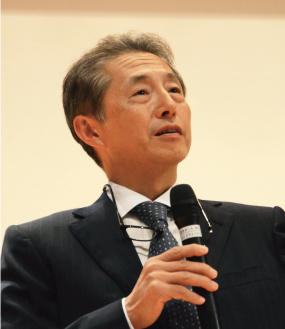
●Panelist●
Tamao Okamoto
Manager of the New Business Promotion Office, Production Engineering Development Center, Production Engineering Division, Panasonic Corporation and Manager of the Personal Care Robot Section, New Business Promotion Department, New Business Promotion Office, Panasonic Production Engineering Co., Ltd.
After completing the course work of the Graduate School of Engineering of Kyoto University in 1995, he joined Matsushita Electric Industrial Co., Ltd. (currently Panasonic Corporation), where he engaged in the commercialization of autonomous mobile robots. Concurrently, he serves as the manager of the Robot Business Promotion Council (Vice Chairman of the Safety Standard Council). He received a Ph.D. in engineering from the Graduate School of Engineering of Nagoya University.
1 Although I majored in robotics at university, I wanted to work in the front line of manufacturing. Shortly after joining the company, I was assigned to engage in facility development. With the emergence of humanoid robots, however, I was assigned to join a national project to develop daily-life support robots, and engaged in the preparation of their safety standards. So I resumed working on robots after taking a roundabout path. In this sense, my studies at university proved to be helpful in my present business. Currently, I'm engaged in a wide variety of tasks related to robots, ranging from their development to the preparation of specifications, and to negotiation with overseas parties.
2 Many years ago, the president of my company adopted the corporate slogan "Super Honest Matsushita Group." This meant that we should consider customers' benefits and convey what we believed to be good for them, rather than what was expected by them. I believe that my "super honest" attitude toward customers was developed in my student days, influenced by Kyoto University's spirit of academic freedom and its defiant attitude toward authority.
3 I would like to encourage present students to go on a trip, and to see firsthand the lifestyles and ways of thinking unique to the regions they visit. You can never achieve a good result in business negotiation if you simply insist your own idea without trying to understand what your opponent wants to say. Traveling provides you with a good opportunity to review your own views and understand other people's perspectives.
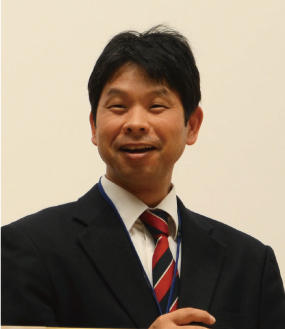
●Panelist●
Tomoo Kinoshita
Chief Economist
Financial & Economic Research Center, Nomura Securities Co., Ltd.
After graduating from the Faculty of Economics of Kyoto University in 1987, he joined Nomura Research Institute (NRI). Subsequently, he engaged in research of Asian economies at NRI Washington, NRI Singapore, Nomura Singapore, and Nomura International (Hong Kong). In 2004, he was transferred to Nomura Securities, and was promoted to a chief economist on Asia in 2005. He was appointed to his present position in 2012. He earned an MBA from Northwestern University.
1 I enjoyed studying economics in my student days, and I am still studying it, so in this sense my career path has been continuous since my student days. I stayed in the United States from the age of 23 to 30. So after returning home, I thought that I would be assigned to the section related to the U.S. economy. However, I was assigned to the Asian section. In retrospect, this was a turning point in my career. I found Asian economies to be extremely dynamic and interesting. After one year, I was asked whether or not I wanted to be transferred to the U.S. section, but I decided I wanted to remain in the same section. Although I have enjoyed this continuity in my career, I've also experienced changes. To become a good economist, I thought that I should earn an MBA and so enrolled at an American university, taking a leave of absence from work.
2 During your student days, you have a lot of free time, so how you spend your free time is important. In my student days, I read many books on philosophy and developed the habit of pondering things deeply. To predict global economic trends in the coming year, it is essential to review various factors from broad perspectives and consider them logically. I now find that the process of logical thinking that I learned during my student days has proved very helpful for my present business.
3 In addition to English, I encourage students to study Chinese. Since the Chinese economy is predicted to expand further, Chinese proficiency will be helpful for a future economist.
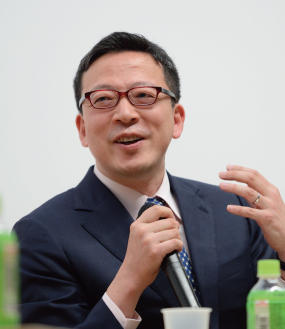
●Panelist●
Yosuke Tsuji
President & CEO
Money Forward, Inc
He graduated from the Faculty of Agriculture of Kyoto University in 2001 and joined Sony Corporation. Three years later, he applied for a transfer to Monex, Inc., which was co-founded by Sony. In 2012, he founded Money Forward, which offers management services of private assets and home economics, along with cloud computing services for small enterprises. He earned an MBA from the Wharton School of the University of Pennsylvania. Currently, he serves as an executive member of the Japan Association of New Economy.
1 After enrolling at Kyoto University, I found that I did not have the aptitude to be a researcher. While I was helping a senior student who had established a private institute to provide supplementary lessons, I found that business was interesting. To become a businessperson active on the global stage, I took a leave of absence from the university for one year and went to the United States to earn an MBA. Then I joined Sony Corporation, which I regarded as the best company for engaging in global business.
2 Soon after my enrollment at the university, I found that I had ample free time. At first, I didn't know what to do, but I soon began to spend most of my free time practicing tennis and reading books along the banks of the Kamo River. I read books on philosophy and pondered the nature of human beings. I enjoyed pondering various things deeply. It was a precious time that gave me the chance to reflect on myself.
3 I encourage students to experience internship, although I myself did not. I recommend that you experience internship at both large companies and small venture businesses. To be employed by a large company, you will have to win against severe competition, and to do so, you will need good luck, in addition to your own ability. On the other hand, you will have a lot more opportunities to be admitted to small ventures. Through internship programs at both types of business, you can find your own aptitude. If you are interested in my company, we welcome cheerful and energetic individuals with considerable physical strength, and who support our vision: to resolve financial challenges with technology.
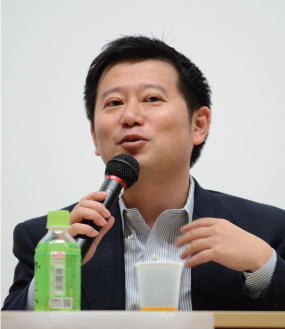
●Panelist●
Haruko Nozaki
Junior Corporate Officer, responsible for administration and CSR, Horiba, Ltd.
President of Horiba Collage
After graduating from the Faculty of Pharmaceutical Sciences of Kyoto University in 1978, she joined Horiba Community Corporation (a company in charge of employee welfare and service administration of Horiba, Ltd.), and was transferred to Horiba, Ltd. in 1980. She was promoted to Manager of the Human Resources Department in 2001, and Vice General Manager of the General Administration Division in 2008, and became the first woman to serve as a corporate officer in 2014. During her student days, she belonged to the American Football Club.
1 When I was looking for a job, I found that not all students who constantly earned high scores in exams at the Faculty of Pharmaceutical Sciences could become good researchers. Having lost confidence in my research ability, I sought job opportunities for office work, but this was still difficult for women at that time. Finally, I found a job thanks to my connection with the American Football Club. On the third day after I joined the company, however, I said to my boss that I would like to quit the company because the job I was assigned was not interesting and it took a long time to commute to the office. He said to me, "Try coming to the office thinking of it as a playground, rather than a workplace." Following his advice, I continued to work. Gradually, I found many employees looked happier after the reform of the personnel system. This made me happy, too. Inspired by this experience, I have continued my service to date, and finally ended up becoming a corporate officer.
2 The head coach of the American Football Club once told me that a female manager should make players wash their own uniforms, rather than washing them herself. It took about 20 years before I began to work seriously. By then, I became aware that it was my mission to improve our workplace environment to support the workers.
3 My advice to students is this: experience exciting and passionate love. Remember that love doesn't always make you happy. You will experience sorrow and unbearable agony, which will usher you to the door of the realm of philosophy. Through rich experience, both positive and negative, you will deepen your emotions and foster your sensibility.
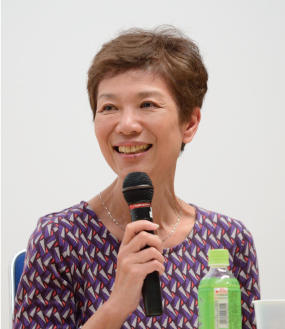
●Panelist●
Makoto Haruta
President & CEO
beta Catalyst, Inc.
After graduating from the Faculty of Law of Kyoto University in 1992, he joined Sumitomo Bank (currently, Sumitomo Mitsui Banking Corporation). In February 2000, he joined DeNA Co., Ltd., and was promoted to a director in September 2000. He was promoted to a managing director in July 2008, and Director and Chairman in June 2011. He led the listing of DeNA on the stock market, the purchase of a professional baseball team (Yokohama BayStars), and other M&A projects. He founded a new company, beta Catalyst, in April 2015.
1 Just like Mr. Sayama, I have been pursuing something interesting. When I was a university student, Japan was enjoying the so-called "bubble economy." Without seriously considering my career plan, I joined a bank and then changed my job by chance. At that time, online business was burgeoning, and I wanted to do something new. In 2015, I founded my own business to create a platform to enable aspiring entrepreneurs to start their own businesses. When you consider your career plans, please consider starting your own business as one option. I hope I can help produce many new businesses and presidents of such ventures. Since students of Kyoto University have high potential, they can start their businesses better than others, only if they are so motivated. After all, it all depends on what option they choose.
2 Studies at Kyoto University that helped me in my career? I'm sorry, I can't think of any. During my student days, I spent most of my time outside the campus and I seldom attended classes. So I'm always at a loss when I'm asked about my student days or about my mentor. However, I loved the parties held after the seminars, so I attended them frequently.
3 During my student days, I traveled around the world. I also worked at local companies, and encountered many people. This experience stimulated my curiosity. As I've done what I wanted to do, I don't regret anything, but recently, I've begun to feel that I should have studied English harder.
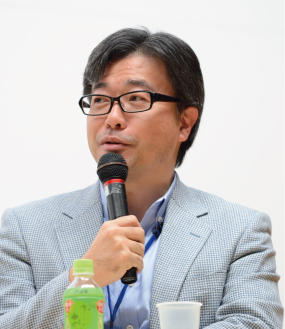
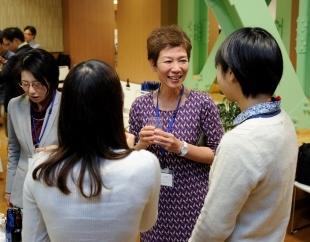
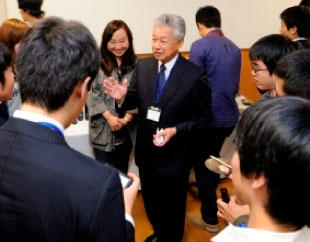
Following the lecture and panel discussion, a party was held involving the lecturer and the panelists. Here are some comments from some of the graduates and students who participated in the party.
"It is exciting to know that the quest for something interesting will help me find my original path." (Junior female student of the Faculty of Economics)
"I had thought that learning a skill was a goal, but I have found that it is not a goal, but rather a means or a tool to be used." (Senior male student of the Faculty of Agriculture)
"I think graduates of Kyoto University should engage in tasks that contribute to humanity. To this end, they should take on great challenges." (Student who completed course work)
"When I was a student, I didn't think about my career plan. I wish we'd had such an event during our student days. As a graduate from the university, I would like to share my experience with the present students." (Graduate)
The event was closed with a greeting by Vice President Tokuga, who is responsible for the university fund administration. He said, "As Mr. Mitachi stated that students and graduates of Kyoto University do not gather together, I hope to hold such events of an optimal scale to ensure a moderate distance between participants so as to maintain the value of Kyoto University."
(Event held in November 2015)

